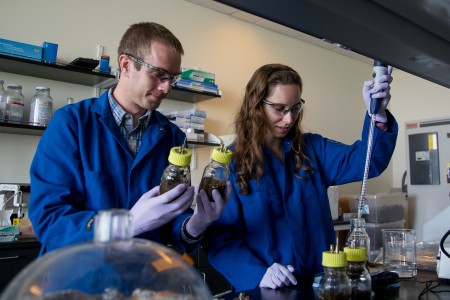UC Davis Biosystems Engineers Win EPA Funding
The U.S. Environmental Protection Agency’s People, Prosperity and the Planet (P3) program has awarded a $14,473 grant to Josh Claypool and Sara Pace, both UC Davis Ph.D. students in biological systems engineering. Their project, “Biorenewable Methane Production,” is one of 42 student-led proposals to have qualified for Phase I funding via the EPA’s annual P3 sustainability competition.

Claypool and Pace began their work roughly a year ago. They decided to focus upon their shared interest in anaerobic digestion, while transforming a class assignment on sample grant proposals into an actual EPA P3 proposal. Their project aims to simplify and improve the production of biomethane, while minimizing related water usage, installation costs and energy costs.
Researchers already know that methane can be derived from manure in a manner that emits less carbon than fossil fuel-based energy production, but current technology is limited by the existing microbial communities used in anaerobic digesters. Claypool and Pace seek to optimize the digester system by enriching their samples — from both compost and manure environments — for microbial communities that will generate the desired methane, while also enhancing the decomposition of cellulose and hemicellulose: typically much harder to break down via such processes. The project is twofold: 1) developing the microbial community itself; and then 2) finding a means to stabilize it.
The ultimate goal is a customized product that could be freeze-dried and packaged, making it available to researchers who’d need only add water, to revive the microbial communities.
“Just as you now can purchase a packet of yeast in order to bake bread,” Pace explains, “industries wishing to start up new digesters could purchase our ready-made, enriched microbial community, that would be ready to go.”
The EPA grant will pay for various materials, from lab consumables to DNA extraction kits. Part of the funding also will help cover travel expenses when Claypool, Pace and their team present their findings at the annual National Sustainable Design Expo, scheduled for late April 2015 in Washington, D.C. If that presentation goes well, the UC Davis researchers will be in the running for P3 Phase II funding of up to $75,000, which would help continue their work for another two years.
Claypool earned his undergraduate degree in biological systems engineering in 2011, at UC Davis. He then transferred to Iowa State University to obtain a master’s degree in agricultural and biosystems engineering, with a minor in chemical engineering. He returned to the UC Davis in 2013, where he hopes to complete his doctorate in 2017.
Pace earned her undergraduate degree in biological/biosystems engineering in 2011, at Penn State University, simultaneously completing a master’s degree in architectural engineering. She subsequently served briefly as an intern for the U.S. House of Representatives Committee on Foreign Affairs, focusing on terrorism, nonproliferation and trade; she then worked for 19 months as a mechanical engineer for Vanderweil Engineers, based in Washington, D.C. She joined the UC Davis College of Engineering in September 2013, and hopes to complete her Ph.D. in biological systems engineering in 2017.
The annual EPA P3 competition encourages college student teams to benefit people, promote prosperity and protect the planet, by designing solutions that move us toward a more sustainable future. Typical projects address challenges from a wide range of categories: water, energy, agriculture, materials, chemicals and the built environment. Teams that advance to the National Sustainable Design Expo will have their projects judged by a panel of experts convened by the American Association for the Advancement of Science (AAAS).
